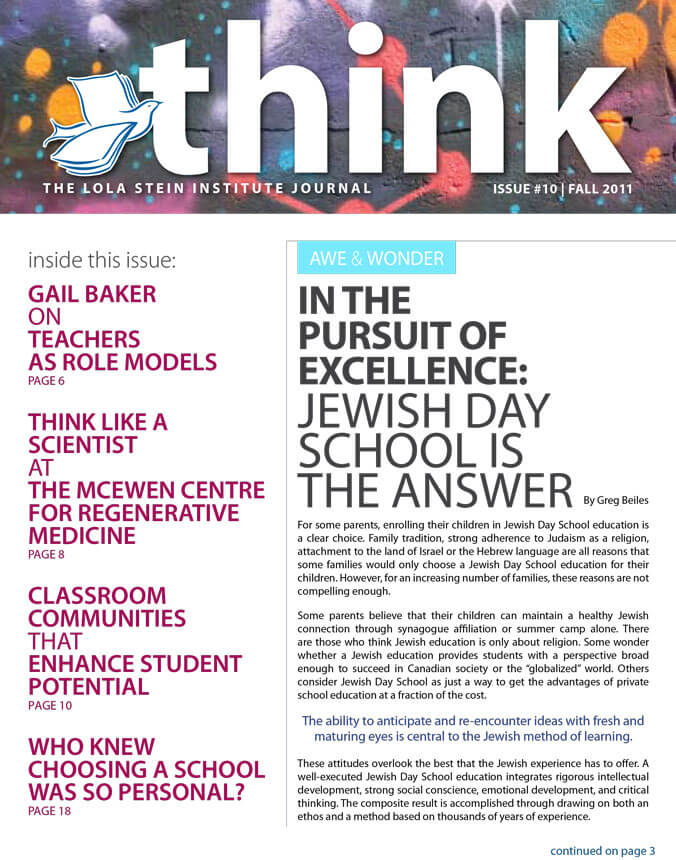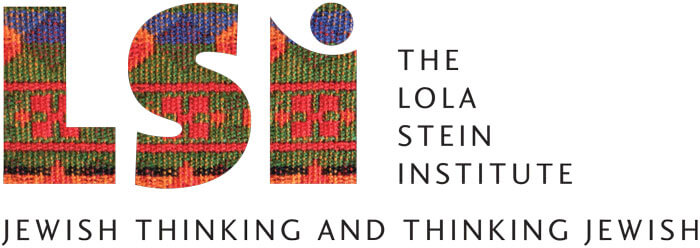- How We Teach

- First Column
- Second Column
- Third Column
- Case Studies

- First Column
- Second Column
- Culture & Community

- First Column
- Second Column
- News & Views

- Admissions

- First Column
- Second Column
- Support Us

- About

- First Column
- Second Column
- Parent Hub
- Attend an Open House
- Take a Tour
- Donate Now
- Calendar
- Blog
- 416-635-1876
- Search
Who Knew Choosing a School Could Be So Personal?
by
We couldn’t let convenience, geography, and neighbourhood dictate our son’s academic future.
My husband and I knew for certain that we wanted our son, Charlie, to attend Jewish Day School. We talked about the educational choices open to us in Toronto over and over again.
Three Jewish Day Schools operate within a 10-minute walk from our home. We visited each at their scheduled open houses. We later met with t he principal and the head of each school privately. Following that, I visited each school unannounced to observe parents dropping off and picking up their children at the beginning and end of the school day. We then expanded this process to two additional Jewish Day Schools further afield, outside the geographical boundaries of our day-to-day community.
When we began our deliberations, my husband and I were both intent on choosing a school close to home: the community where we live, the neighbourhood where our son plays with children on our street, where many families attend the same synagogue, and where more children attend one of the three Jewish Day Schools nearby. We truly embrace our community and feel very close to the families around us. How convenient our lives would be if we could choose one of these schools!
Weeks passed, months passed. All of our friends had made their decisions, and we were still agonizing. Why was the decision so much more difficult for us? Why did we spend our evenings deliberating over a decision that everyone else had resolved? We admitted that all of the schools were “good.” We acknowledged that all the schools had “nice families,” and we agreed that our son would be happy and do well at any one of these schools.
In today’s hectic society, the fundamental parenting premise to respect what is best for our children is not necessarily instinctual. As we make decisions for our children, we contemplate the expense to us, the convenience to us, the reputation, labels, and history of the school, and, of course, our friends’ choices. The determination of Charlie’s school became so difficult for us because intellectually we knew that convenience, geography, and neighbourhood were not true indicators of what should become our son’s academic community. Our minds found the decision to be quite simple, but our hearts were silent.
How easy to be willfully blind to all the choices out there, willfully blind to everything but convenience, and willfully blind to what is actually int he best interest of our son and our family. The decision did not come naturally. Charlie’s education mattered to us, yet it didn’t seem to matter to others, and that’s where we were stuck.
As we sat with the principals discussing their schools, they generously shared their visions, philosophies, and approaches to education. Each conveyed his/her students’ successes and explained the measured outcomes of academic achievement. New to the process, my husband and I were highly impressed.
When we met with Gail Baker and Greg Beiles at The Toronto Heschel School, the interview assumed a unique tone at the outset. As we sat down to talk, Gail looked at us with a warm expression, smiled, and with a pencil and note pad in her lap said, “Tell me about Charlie…”
My husband and I were stunned. No one had once asked us about our son during all the interviews we had attended. Yet here the most obvious question was being asked: “Tell us about your son. Tell us about your Unique Gift of life. Tell us, tell us, tell us…” Neither Gail nor Greg said let us tell you about us.
Today, a year and a half later, I reflect back on my answer. I told Gail all about Charlie…about his curiosities, his questions, his wonderment at life’s miracles, about his soul. I told her about these things because they are what really matters most to us about our son…and now, we realize, that is what matters most to our school and school community.
Choosing a school is the most personal decision a parent can make. The human aspect and the personal touch are more important to me that I ever knew. I hadn’t realized that I needed to feel that my child is a welcome part of the whole, a valued member of the community. I needed to see that everything about my son mattered to his school.
Today, my son not only feels that he is a part of the Heschel community, he also feels that he is an important member of a wonderful place. As the feeling has grown, it has nurtured in Charlie a sense of self-worth and a commitment to his school community that makes us laugh with pure joy and feel very proud. And he’s only five!
It became clear to my husband and me what it was that was most important to us in a school. We needed to first and foremost love the purpose of the school and to connect to its vision. While we respect that all schools are committed to admirable philosophies of education, we needed to feel the school’s commitment to each student. We find Toronto Heschel deeply grounded in its founding vision; a personal holistic commitment to each much loved and unique child. If I am sharing my child with the school’s teachers, I need to know they really care.
We understand now that for us the right question wasn’t which academic community was best for our child. The right question was whether that community existed.
When children and families are comfortable, happy, and confident in their academic setting, the community blossoms; it becomes a community of shared ideologies, shared visions, and shared strengths. We are thrilled to be a part of a school founded on community, one that sees itself as more than simply a place for children to learn seven hours a day.
For me, Toronto Heschel’s community embrace of MY PARTICULAR CHILD is front and centre. Through all those months of deliberation, I guess we were holding out for the personal touch. We didn’t even know.
It continues to be a great source of pride for our family to be part of such a miraculous community. Who knew schools could be so personal?
Lainie Rapp graduated with a Master of Social Work from Wurzweiler University in New York City. She consults part time on a palliative care team at Sunnybrook Hospital, teaches grief and bereavement counselling at George Brown College, and facilitates a bereavement support group at Wellspring. She and her husband have one son and are proud parents in the Toronto Heschel community.
Perspectives
 The Lola Stein Institute (LSI) is a centre of inventive educational thinking and addresses the challenge to re-frame schooling for the exigencies of our times.
The Lola Stein Institute (LSI) is a centre of inventive educational thinking and addresses the challenge to re-frame schooling for the exigencies of our times.









